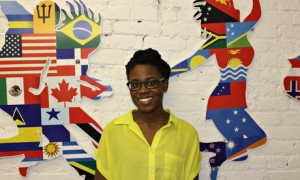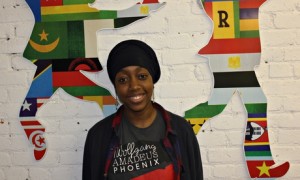How Would You Rate Your Hometown?
Maayan Cohen
|February 6, 2014

Makayla Comas, 17, from New York. Photograph: Guardian Cities
Last week, The Guardian interviewed teenagers in several cities from across the world about how they rate their home cities of London, Johannesburg, Rio, and New York City!
These young people provided incredible reflections about what they appreciate about their home cities and the things they would like to change. They artfully expressed their ideas that touched upon issues ranging from environmental justice, safety, and their public education systems to environmental sustainability, public transportation, and climate change action and preparedness.
The three NYC youth interviewed (Amosh Neupane, Makayla Comas, and Kafila Muhammad), work with one of our amazing partners, Global Kids, as youth leaders focused on human rights and climate change issues — two of whom, Amosh and Makayla, are also ACE leaders who joined ACE at PowerShift ‘13 this fall!
What kind of positive changes do you want to help create in your city? How can we make our cities more resilient and part of climate change solutions? These young people have shared some awesome ideas and observations. Here are a few:
Makayla (NYC): “Make it popular. News about Brad Pitt and other celebrities is perpetuated in the media every day, but you don’t see an article on climate change or the sea level rising every day, so maybe if it was more popular and in your face, there would be more community involvement. We’re a very creative generation and we find different ways to interact with people through social media, music and TV, so if the eco message was channelled through these forms, people would take note.”
Amosh (NYC): “There were problems with the transportation here after hurricane Sandy. The transportation was down for 10 days and some train stations are still suffering, they are still being renovated. So I guess since the transportation system and subways were established over 100 years ago, we need to update what we have and build more climate-resilient infrastructure in our city.”
“In our society, people tend to forget if something has not been talked about for a long time. Climate resilient infrastructure, global warming and the endless effect on our city is something we need to talk about – we need to hold symposiums and conferences, get more community involvement…So I think we need to incorporate environmental issues into books, pop songs and movies to get more youth involved, because those are the things we are into.”
“I would love to see more green roofs and parks in the city, like the High Line. I would love to see the river and the water sources around the city kept clean. I would love to see more bike lanes, more public transport utilised rather than vehicles, and more green buildings.”
Kafila (NYC): “If you look at the demographics of different neighbourhoods here, you’ll see the resources they have are different – the community gardens, the kinds of stores, the carbon emissions that are put out. If you go to a store in a less affluent neighbourhood, generally with more people of colour, it’s hard to find food that is organic, or any kind of healthy, sustainable food – and if it is stocked at all, the produce is often overgrown, full of pesticides, and doesn’t look healthy. Instead you will see mostly liquor stores, fast-food restaurants and things that don’t contribute positively to the environment. So sometimes different communities are disadvantaged not only because of the racial boundaries but also because of their financial boundaries. If there was equality, or at least some kind of balance, more people would be able to get involved with environmentalism and make more healthy, sustainable life choices.”
Michel (Rio): “I want a city with fewer cars and better public transport services. Less trash on the floor, better sanitation in the slums, the demilitarisation of culture in the slums, more leisure options, less pollution on beaches and less dishonesty among top politicians.”
Lebohang (Jo’burg): “Some of the parts of South Africa are not safe … When I’m in those areas I don’t feel very safe. The difference between those areas and my area is very visible, those areas are dirty, with rubbish on the floor, papers everywhere and plastic bottles. I think it will only change if the people in those areas take care of it more but the local government could help. Some of the people who live there think the government doesn’t care about them any more, because when they look at their habitat, they see all the dirtiness and they feel like they have been left with no care.”
Raíssa (Rio): “My neighbourhood is one of the places that still has lots of trees. But nobody cares about recycling, people are not really educated for that. Some people use bikes, but there are a lot of cars. I really care about the environment – but everything about the environment and the danger of not taking care of it doesn’t feel like a necessity, so nobody cares at all. Not only the children disregard it, but the adults too.”
Yara (London): “It depends what you grow up around. When I was in school, in science class we always talked about global warming and it was always something that was brought to my attention. But I guess in everyday life you don’t really stop and think, is what I am doing benefiting the planet? I would like to see it implemented into law, so in your day-to-day endeavours it’s something that you have to do – made part of your daily habits. In supermarkets at the moment you are encouraged to bring your own bags, but there’s no law about it, so it’s hard to create change – all bags should be recyclable and we should charge for plastic bags. Social media campaigns only help temporarily; we need to enforce it more so it becomes force of habit.”
To read more, check out the entire article on the The Guardian here.
Thank you, Amosh, Makayla, and Kafila (and the young people interviewed from Rio, Johannesburg, and London!) for speaking out on the issues you most care about, helping to bring climate change conversations to center stage and for being leaders in your communities!
Join our Youth Action Network
More Blog Posts

Our Climate Wins Were on Display at the State of the Union
Today, the Biden Administration temporarily halted all pending decisions on 17 Liquefied “Natural” Gas (LNG) projects across the Gulf South.
Read More
ACE Honored As An Anthem Awards Finalist
Action for the Climate Emergency (ACE) announced today that it won Bronze in Best Use of AI at the 3rd …
Read More
BREAKING: Biden Halts LNG Export Expansion
Today, the Biden Administration temporarily halted all pending decisions on 17 Liquefied “Natural” Gas (LNG) projects across the Gulf South.
Read More

